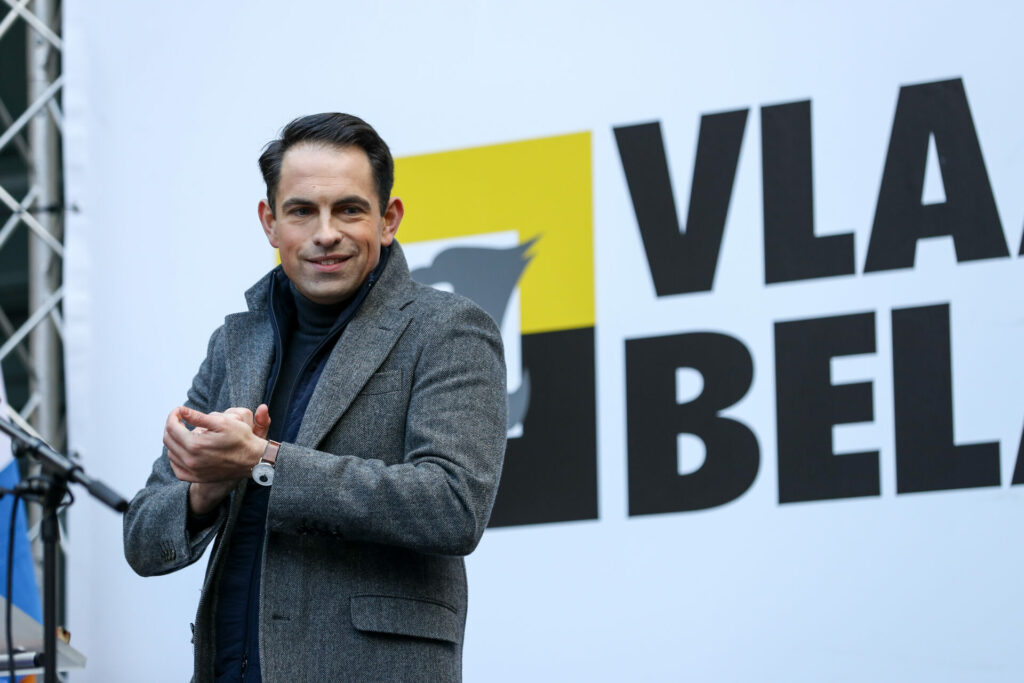Just over a quarter (25.5%) of people in Flanders say they will vote for the far-right, Flemish-nationalist Vlaams Belang at the 2024 elections. Party leader Tom Van Grieken is now in the top three most popular politicians in the region, a new poll by Het Laatste Nieuws and VTM Nieuws shows.
The poll was conducted at the end of November, with 1.5 years to go before the May 2024 elections. Still, the results show that Vlaams Belang's success during the 2019 elections – where it won 18.7% of the votes, 12% more than the previous elections – will seemingly continue.
"I have never been fooled by bad polls. I started with about 10% and then even dropped towards the electoral threshold (5%). You will therefore not hear me triumphant today at good polls," Van Grieken told De Morgen.
As 25.5% of Flemish people now want to vote for Vlaams Belang, only the Flemish rightwing N-VA and socialist Vooruit parties can stay somewhat close, with 22% and 16.1%, respectively. Even counted together, Christian democrats CD&V (9.6%), liberal Open Vld (9.3%), and ecologists Groen (8.7%) only have a handful of percentage points more than the far-right party.
However, it is not yet too late to reverse this trend before the elections, said political science professor Carl Devos (UGent), but only if the governing parties implement necessary reforms. "And if they defend them together, but I am afraid they will not. Everyone is trying to only present themselves: Open Vld, CD&V, Groen, while [French-speaking socialist party] PS blocks the social reforms. This way, Vlaams Belang does not even have to try."
Politicians' hope that Vlaams Belang's support would "automatically" go down in the polls over time seems to have vanished: it has been two years since the formation of the Federal Government, and the Covid-19 crisis has also been past its peak for months.
"The easy explanation for this success is that Belgium continues to struggle with migration. Look at the rioting youth in the cities. If I send a sharp tweet about that, I get all the attention," Van Grieken said. "But what I have been making clear for some time is that we also face enormous socio-economic problems."
'A clear message'
According to him, the media do not pay any attention to Vlaams Belang's socio-economic analysis and only focus on the party's strong anti-immigration agenda. "A one-issue party cannot get more than 15% of the vote. With 25%, you also have something to offer socio-economically."
It is true that since taking up his position as party president in October 2014, Van Grieken has paid more attention to socioeconomic themes, while also shifting the geographical focus from large cities to smaller towns and municipalities.
During the 2019 elections, Vlaams Belang election campaign focused heavily on the theme of pensions – with many Flemish people voting for the party's rather leftist economic points, seemingly willing to accept the party's far-right and xenophobic views as part of the deal.
Today, Vlaams Belang is mainly targetting the Federal and Flemish governments' insufficient protection of people's purchasing power and the growing energy poverty, with online ads and paper flyers titled "They are leaving you behind."
Related News
- Nine arrested in Ghent before lecture by Vlaams Belang parliamentarian Filip Dewinter
- Ikea tells Vlaams Belang to stop using it for propaganda
- Flemish government taken to court over new integration policy
Political experts have argued that the party's strong growth is mostly due to the weak social policy of the current government(s), pointing to the Flemish issues with the daycares, for example. They also added that extremist parties traditionally do well in times of crisis – which Belgium has seen a lot of in recent years.
"Vlaams Belang has a very clear message. One that is delivered in the language of the common people as well. That works. The success of Conner Rousseau and Vooruit is based on the same basis," Devos said. "For the other traditional parties, to which I count Groen, the situation is gradually becoming catastrophic. Disaster threatens them in 2024.”
During the Vooruit party congress last weekend, Rousseau emphasised that while Vlaams Belang presents itself as a social party, this is not true. "They are the friends of the multinationals, the friends of the medieval conservatives, the friends of Putin and other dictators. The extreme right says that it stands up for the common people, but when push comes to shove, they do not give a sh*t about ordinary people."

